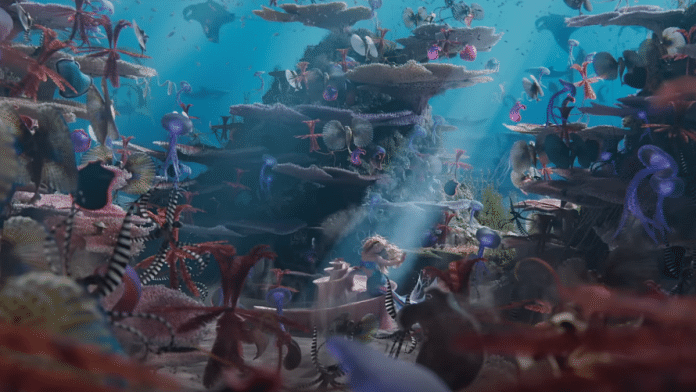Disney’s much anticipated live-action adaptation of The Little Mermaid is a disappointing take on a classic fairy tale. Besides its lead, the singer-actor Halle Bailey, everything else is dull and lifeless. The 135-minute Rob Marshall directorial is a drag and fails to live up to the hype around it.
Written by David Magee, the plot is based loosely on the original story by Hans Christian Andersen. When a dangerous storm threatens the lives of a passing ship’s crew, Ariel breaks the cardinal rule set by her father, King Trident (Javier Bardem) – of not interacting with humans. Driven by her kindness and curiosity, Ariel offers a helping hand to the ship’s distressed passengers, saving and falling for Prince Eric (Jonah Hauer-King) in the process. Desperate to spend more time with Eric, Ariel makes a deal with her evil aunt Ursula (Melissa McCarthy), who allows her to become human for three days at a severe cost. The couple’s arduous journey to a happy ending forms the crux of the story.
Even a great cast can’t save this film
The film’s lead will probably stay with you even if the lacklustre movie does not. Bailey is convincing and endearing as the rebellious but kind-hearted Ariel, who must simply satisfy her inquisitiveness. Her expressive eyes and smile entrance more than just Eric – they will probably make you want to watch more of her in the future too. From her longing for Eric to her realisation of betraying her father, Bailey displays a truly remarkable range of emotions.
McCarthy is at her best as Ursula. The comic star is impeccable as the movie’s deep sea villain, keeping the momentum going with her sinister expressions and seamless dialogue delivery. Her devious act keeps the film afloat even when the pace slows down painfully. Here’s hoping she gets her own spin-off.
Bardem is earnest as King Triton but does not have the most well-written character. However, as the king torn between his love for his favourite daughter and his underwater kingdom, he is just the right man.
But Hauer-King’s portrayal of Eric is so soulless that you wish Ariel wouldn’t chase him. He does not look like a man in love, or the potential commander of a kingdom. Bailey’s spirited and soulful performance clashes with his stone-like expressions, taking away from the chemistry one would expect the lead pair of a fairy-tale romance to have.
Flounder (Jacob Tremblay), Sebastian (David Deegs) and Scuttle (Akwafina), the sea characters who always come to Ariel’s aid, are appealing because of the actors who voiced them and add life to an otherwise insipid film.
Also read:
A dated story with below-average graphics
The VFX underwater world doesn’t dazzle as much, failing to match up to the lasting magic the 1989 2D animation created. Moreover, James Cameron’s Avatar: The Way of the Water (2022) has set the bar pretty high, and The Little Mermaid falls short. Apart from Ariel’s glistening scales, nothing wows the viewer. Marshall did a stellar job with Life of Pi in 2012 but does not know what he is doing with this film.
From flowing CG hair to funny aquarium-like reflections, Marshall’s visual effects lack appeal, impact and seriousness. However, what does stand out is the song Under the Sea, which brings back childhood memories with its stunning visuals and colours.
The element of nostalgia is palpable in The Little Mermaid, but its unoriginality is hard to ignore too. The film is a frame-by-frame recreation of the original, with no new defining elements other than its lead, who isn’t a White redhead this time. When a remake is set almost three decades later, one would expect new imaginative elements to pop through, which really doesn’t happen in this movie’s case. The side plot of mermaids luring men to their deaths in Pirates of the Caribbean: On Stranger Tides (2011) would make for a better watch.
The Little Mermaid should probably take a leaf out of Queen Charlotte: A Bridgerton Story for making stories set in earlier times impactful, diverse, and relevant to the modern era. Using a black actor but not acknowledging their character’s race feels like an act of tokenism. Instead of seeking to undo Disney’s history of cultural appropriation (such as in Pocahontas) and sexism (like in Sleeping Beauty), the makers of The Little Mermaid ensure Ariel only cares about breaking the rules and putting her entire kingdom in jeopardy over a man she met three days ago.
You might feel better rewatching the original instead.
(Edited by Zoya Bhatti)






